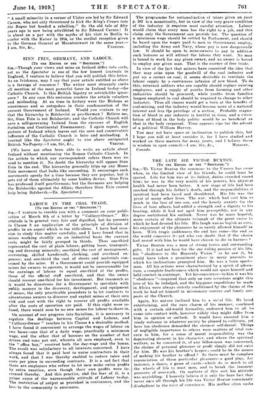LABOUR IN THE COAL TRADE.
Ito THE EDITOR Or THE " SPEMT01."i Sic,—I venture to trouble you with a comment on your publi- cation of March 8th of a letter by "Colliery-Owner." His attitude is in general very fair and dignified, but he presents in Clause 3 an application of the principle of division of profits in an aspect which is too ridiculous. I have had occa- sion to study this matter carefully, and I have found that in mines working steadily on an industrial basis the current costs might be fairly grouped in thirds. Thus 'one-third represented the cost of plain labour, getting loose, transport- ing and dressing minerals; one-third the cost of management, overseeing, skilled handicraft, clerking, and overhead ex- penses; and one-third the cost of stores and materials con- sumed by the mine. If a Government could provide equipped mines for owners to operate, it Would not be unreasonable for the earnings of labour to equal one-third of the profits. those of the official staff one-third, and that the owner should recover one-third for his investment. But inasmuch as it would be disastrous for a Government to speculate with public moneys in the discovery, development, and equipment of mines, the only practicable procedure is to let contracts to adventurous owners to discover and exploit mines at their own risk and cost with the right to recover all profits available after the costs of operation are paid. If this right were re- fused, there would soon be no new mines for labour to share in. On account of our progress into Socialism, it is necessary to regulate the dealings between Capital and Labour, and Colliery-Owner" touches in his Clause 4 a desirable method. I have found it convenient to arrange the wages of labour on two bases—one that of a daily wage, practically a minimum wage, and the other that of bonuses on the number of feet driven and tons put out, wherein all men employed, even to the office boy," received both the day-wage and the bonus. The result was satisfactory to all interests concerned. I have always found that it paid best to nurse contractors in their work, and that I was thereby enabled to reduce rates and costs per piece in succeeding contracts. It is a sad fact that there are employers who refuse to let men make extra profits by extra exertion, even though their own profits were in- creased thereby. And this practice, aid the fear, of it, is a Prime cause of the Unreasonable attitude of Labour to-day. The restriction-et output 60 provoked is continuous, and the loss, to the -community is enormous. The programme for nationalization of mines given on.your p. 292 is a monstrosity, but in view of the very grave condition of the industry it requires most careful attention. Labour would claim that every man has the right to a job, and this claim only the Government can provide for. The question of a minimum wage should be settled by Parliament, and should be based upon the wages paid to men in Government employ_ including the Army and Navy, whose pay is now dangerously low. It should be open to mine-owners to pay in addition such bonuses as will attract the labour they want. No man is bound to work for any given owner, and no owner it bound to employ any given man. That is the essence of free trade.
In view of the fact that miners have conceived the idea that they may seize upon the goodwill of the coal industry and put up a corner on coal, it seems desirable to ventilate this labour supply by a continuous infusion of new blood. To do this, returned soldiers who are capable should replace existing employees, and a supply of youths from farming and other industries should be procured, while youths from families longest employed in coal should be required to change to other industry. Thus all classes would get a turn at the benefits or coal-mining, and the industry would become more of o national interest and less the privilege of a section. Probably stagna- tion of blood in any industry is hurtful in time. and a circu- lation of blood in the body politic would be as beneficial as that in the body corporeal. Time appears ripe for the advent of a political William Harvey.
You may not have space or inclination to publish this, but I hope you will at least consider it. for I have studied and worked on these matters for molly years, and I believe there
is wisdom in open council.—I arts, Sir, &c., MCMOER. Canada.


































 Previous page
Previous page